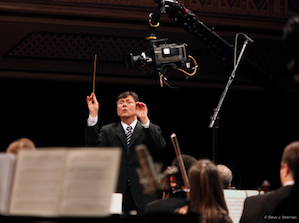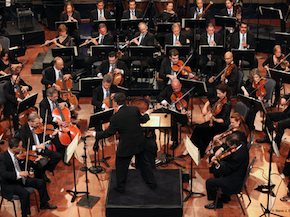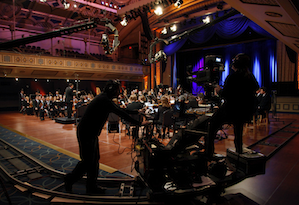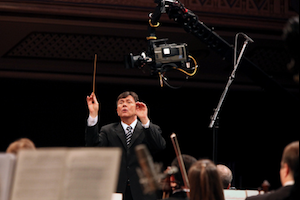
It’s become the mantra-lament of the era that the audience for classical music is dying out, and the next generations are not assuming roles as cultural protectors. Leaders of America’s most expensive cultural assets — orchestras and opera houses — are particularly worried. And so you find insistent efforts to bring classical music to the young, and in a way that’s both compelling and educational.
One of those efforts is a series of eight one-hour TV programs starring the “All-Star Orchestra.” The first episode began appearing on WNET in New York in September and has been picked up by KQED and other public television stations, to air possibly in November or December. (The TV series is due in the Bay Area this fall and it will be release on DVD later this month.)
The all-stars are 90 musicians chosen from 30 of the top orchestras in America. The episodes explore such topics as “What Makes a Masterpiece,” “Politics and Art,” and, “Music’s Emotional Impact.” Classic European works are matched with the works of American composers, and so in “What Makes a Masterpiece?” the program includes Ludwig van Beethoven’s Symphony No. 5 and Philip Glass’ Harmonium Mountain.

The episodes and are distinguished by the presentation itself. Using 19 cameras filmmakers offer an intense and intimate portrait of classical music and how it’s made.
It was all conceived by conductor Gerard Schwarz, who in 2011 ended his 26th and final season as musical director of the Seattle Symphony. Schwarz, who was educated at Juilliard, has also been the music director for New York’s Mostly Mozart Festival Orchestra, the Royal Liverpool Philharmonic, the Los Angeles Chamber Orchestra, and the New York Chamber Symphony.
“We hope we can really make a difference in the understanding and appreciation of classical music,” Schwarz told us earlier this week.
He got the idea five years ago and approached the project as though it were a startup, raising money from friends first and then looking for support among people who look at the arts with a worldwide perspective, as opposed to people who might be considered, as he put it, “Seattlecentric.”

“Everybody knows that with a startup nine times out of 10 money is lost. The hard part with this was to convince people that while this had never been done before, certainly not since live TV concerts in the 50s, it was still a great possibility."
"And judging by early reaction, we were right. The question from investors was, ‘How can you get 90 people from 30 different orchestras and get a cohesive sound? How can that have any kind personality? How can they get that when it takes years for an orchestra to accomplish these things?’ I can tell you there were very few people who bought in 100 percent.”
The project cost $2 million, about $250,000 an episode. Schwarz is hoping to produce another 8 episodes next year, if he can find the money. “I’d like to see it go on forever. We want to create a library of major works.”“Music should be a core in education. Everyone needs to understand that. Someonw who studies music is five times more likely to graduate than someone who doesn't.” - Gerard Schwarz
An interactive website is scheduled to go up in January, and there’s a plan to stream episodes later in the year, with the intention of reaching college students.
“We’re working with the National Association of Music Education (NafME), which has 130,000 members. Our plan is to make everything available for free so that this can really become part of people’s lives.”
“Music should be a core in education,” Schwarz continued. “Everyone needs to understand that. Someone who studies music is five times more likely to graduate than someone who doesn’t and you know what? It’s the math and science teachers who are among the most excited about music graduates because they see how focused and disciplined they are.
“When I was growing up we had a chorus, a band, and an orchestra — in an elementary school. Can you imagine? It was remarkable, and then 25 years later I was asked to come and convince the board of education not to fire the last music teacher. But it’s changing back again: People are becoming aware of how music can inspire young people to accomplish things in a positive ways.”

